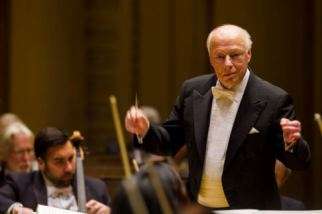|
Back
Going Dutch New York
David Geffen Hall, Lincoln Center
04/14/2016 - & April 15, 16, 19, 2016
Gustav Mahler: Symphony No. 9
New York Philharmonic, Bernard Haitink (conductor)

B. Haitink (© Todd Rosenberg)
“Mahler’s five latter symphonies...seek to be colossal, and achieve vacuity.”
Paul Rosenfeld, Musical Portraits, 1920
Discovering Mahler’s symphonies in the 1950’s was the beginning of a lifelong journey of pathos, bathos and wonder. Still generally considered trash or “movie music”, these masterpieces received short shrift from the recording industry. However there were a few pioneers, notably F. Charles Adler and Hermann Scherchen, before the glorious revolution led by Dimitri Mitropoulos and Leonard Bernstein at the end of the decade. In Holland Bernard Haitink took over the Concertgebouw Orchestra (they were not ”Royal” then) during that same time period and began a superb collaboration that produced some of the best Mahler pressings in memory.
Rather remarkably, Maestro Haitink is still active today and led Mahler’s own orchestra in his valedictory symphony. Let me tell you, it is positively surrealistic to see a man who was leading Mahler symphonies near the dawn of the LP era still on the podium in 2016.
Willem Mengelberg was a great advocate for the Viennese composer and conductor, even presenting a Concertgebouw concert the first half of which was the newly completed Symphony No. 4 and then the second half of the evening was the same 4th Symphony with the audience now more acclimated to the unusual piece with a soprano soloist in the last movement. Mahler began to think of Amsterdam as his second home, at least until he came to New Amsterdam to lead both the Metropolitan Opera and the Philharmonic. This nostalgic evening brought back the realisation that the limping genius lived just down the street from the site where Lincoln Center would eventually be built (Bartók lived even closer).
Something was dreadfuly wrong with Haitink’s execution this evening. It seemed almost as if he were following his troops rather than leading them. He is remarkably spry for a man of 87, but seemed detached throughout. Let’s explore some high and low lights:
Good: The sound of the expanded orchestra was excellent.
Bad: The incredible score was often ignored, and not in a creative way.
Good: The fortissimos and pianissimos were unabashedly contrasting.
Bad: The normally intense third movement was much too slow and flabby. The last four measures – a particularly frightening and normally crisp passage – was like lukewarm dishwater. Compare the Horenstein recording, or, my personal favorite, the rather rare pressing led by Hans Rosbaud.
Good: The solos of principal violist Cynthia Phelps and concertmaster Frank Huang were gorgeous.
Bad: The normally ever-present rubato of the first movement was simply ignored.
Good: Adding a ninth double bass for the finale helped to flesh out the sound.
Bad: Sloughing through the last few minutes of the ending was inexcusably aggravating. Haitink seemed only interested in getting out of there. On the day when James Levine announced his retirement as music director of the Metropolitan Opera it seemed fitting to contemplate the future of Bernard Haitink. Maybe it was just a bad night.
By all accounts, the Phil is much improved over the ragtag band that Mahler inherited and has recently reached new levels of professionalism under outgoing music director Alan Gilbert. Next on the agenda is a two or three year diaspora while the auditorium undergoes major renovations. The challenge will be to match repertoire to venue, as no one location will be able to accommodate the orchestra for a full season. Hopefully a deal can be reached with Carnegie Hall (where Mahler served as conductor) for at least some evenings, since no other local space is acoustically able to handle such complex works as the one on this current program. Once again they will be led by a Dutchman, Jaap Van Zweden.
Fred Kirshnit
|